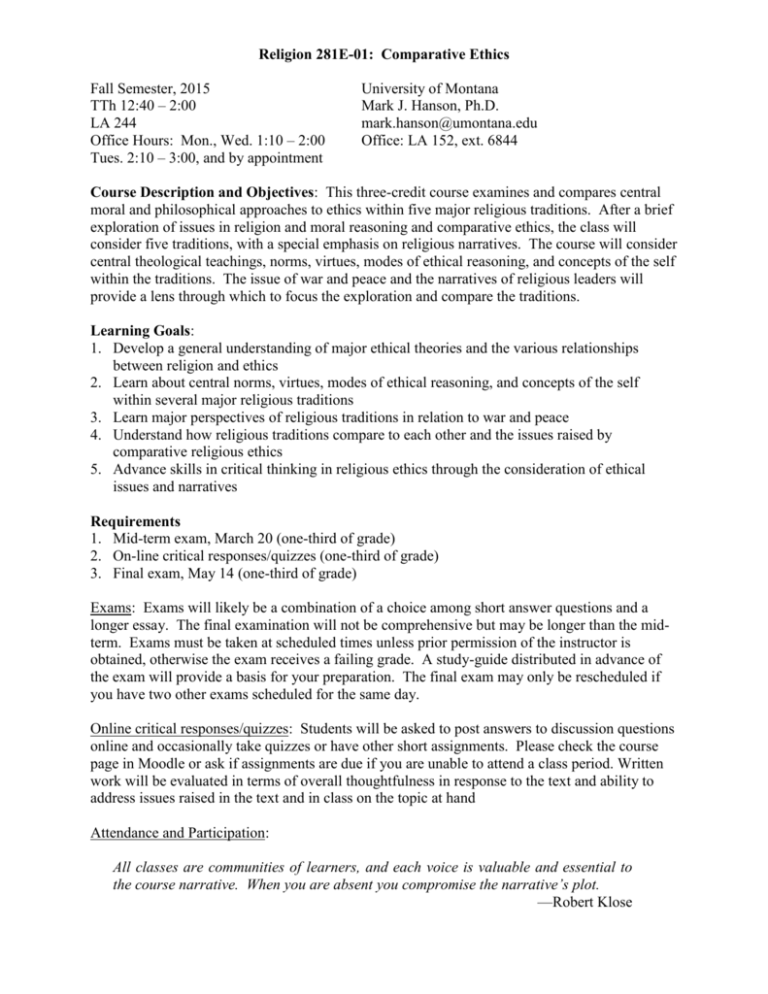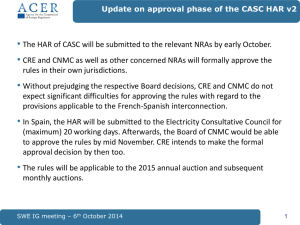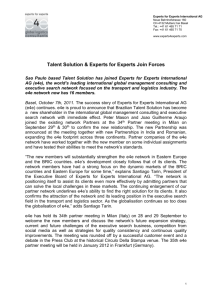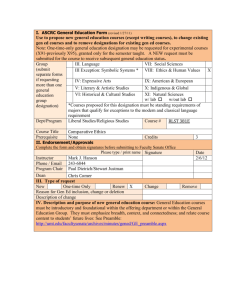RLST 281E- - Comparative Ethics
advertisement

Religion 281E-01: Comparative Ethics Fall Semester, 2015 TTh 12:40 – 2:00 LA 244 Office Hours: Mon., Wed. 1:10 – 2:00 Tues. 2:10 – 3:00, and by appointment University of Montana Mark J. Hanson, Ph.D. mark.hanson@umontana.edu Office: LA 152, ext. 6844 Course Description and Objectives: This three-credit course examines and compares central moral and philosophical approaches to ethics within five major religious traditions. After a brief exploration of issues in religion and moral reasoning and comparative ethics, the class will consider five traditions, with a special emphasis on religious narratives. The course will consider central theological teachings, norms, virtues, modes of ethical reasoning, and concepts of the self within the traditions. The issue of war and peace and the narratives of religious leaders will provide a lens through which to focus the exploration and compare the traditions. Learning Goals: 1. Develop a general understanding of major ethical theories and the various relationships between religion and ethics 2. Learn about central norms, virtues, modes of ethical reasoning, and concepts of the self within several major religious traditions 3. Learn major perspectives of religious traditions in relation to war and peace 4. Understand how religious traditions compare to each other and the issues raised by comparative religious ethics 5. Advance skills in critical thinking in religious ethics through the consideration of ethical issues and narratives Requirements 1. Mid-term exam, March 20 (one-third of grade) 2. On-line critical responses/quizzes (one-third of grade) 3. Final exam, May 14 (one-third of grade) Exams: Exams will likely be a combination of a choice among short answer questions and a longer essay. The final examination will not be comprehensive but may be longer than the midterm. Exams must be taken at scheduled times unless prior permission of the instructor is obtained, otherwise the exam receives a failing grade. A study-guide distributed in advance of the exam will provide a basis for your preparation. The final exam may only be rescheduled if you have two other exams scheduled for the same day. Online critical responses/quizzes: Students will be asked to post answers to discussion questions online and occasionally take quizzes or have other short assignments. Please check the course page in Moodle or ask if assignments are due if you are unable to attend a class period. Written work will be evaluated in terms of overall thoughtfulness in response to the text and ability to address issues raised in the text and in class on the topic at hand Attendance and Participation: All classes are communities of learners, and each voice is valuable and essential to the course narrative. When you are absent you compromise the narrative’s plot. —Robert Klose 2 Attendance is important (i.e., central to learning) and expected. Unexcused absences may affect your grade. If you have a valid reason for missing several classes, such as illness, disability or other conflicting commitments, you still must speak with the instructor. (Documentation may be required.) Participation requires bringing your text to class, taking notes, being attentive, and trying to make thoughtful contributions to class discussions. Participation also requires responding satisfactorily to weekly participation requirements, such as submission of questions or ideas. Academic Dishonesty and Plagiarism: All work submitted is expected to be the student’s own. Any acts of plagiarism or academic dishonesty will result in automatic failure of the course and may result in further academic punishment. If you have any doubts about definitions of plagiarism or academic dishonesty, please review the relevant sections of the University Catalog. Grades given reflect the following criteria of judgment and will be recorded using pluses and minuses: F: D: C: B: A: Failure to meet minimum requirements Unsatisfactory, but some effort to meet minimum requirements Satisfactory; meet minimum requirements of assignment but not much more Good to very good: thoughtful reflection, good analysis Excellent depth of critical analysis, thoughtfulness of reflection; creativity and mature analytical skills going beyond the primary requirements of the assignment Students with Disabilities: In accordance with the University of Montana’s mission to provide equal educational opportunities for all students, necessary accommodations for students with disabilities will be made whenever possible. If you require accommodations, please provide written information regarding your disability from the Disability Services as soon as possible so that accommodations can be made. Classroom Etiquette Please arrive on time and do not walk out on classes early or in the middle of discussion without prior permission. Doing otherwise is disrespectful. Give the class full attention: no side discussions, newspaper reading, crossword puzzles, or use of electronic devices. Anything other than full attention will count as an absence. Cell phones: Please turn off all cell phones prior to class unless you have informed me that you have a legitimate reason: for example, you are an EMT or a firefighter, parent of a young child, or are expecting an emergency call. If you are expecting a call, please keep the phone on the vibrate mode and step outside to take the call. Each instance of texting in class will count as an absence. Laptop and smart phones: The use of laptops and smart phones is not permitted without permission. Laptops used for text reading and/or note-taking must be used in the first two rows of seats. Required Reading (available at the UM Bookstore) Comparative Religious Ethics: A Narrative Approach, ed. Darrell J. Fasching & Dell deChant The Bhagavad-Gita Other articles on course website 3 ASSIGNMENTS AND CLASSES Date Topic I. Introduction: Religion and Moral Reasoning 9/1 Introduction to the course 9/3 Introduction to ethics and religion (no reading assignment) 9/8 Religion, Ethics, and Storytelling CRE: Introduction, ch. 1 9/10 War and Peace in an Age of Globalization CRE: ch. 2 9/15 The Religious Quest CRE: ch. 3 and Part II introduction II. Hinduism 9/17 Hindu Stories: Ancient and Postmodern CRE: Ch. 5, pp. 137-43 9/22 The Bhagavad-Gita, chs. 1-6 9/24 The Bhagavad-Gita, chs. 7-9 9/29 The Bhagavad-Gita, chs. 10-18 10/1 Comparative Reflections; Excepts from the film Gandhi and discussion CRE: Ch. 5, pp. 148-64 III. Buddhism 10/6 Buddhist Stories: Ancient and Postmodern CRE, pp. 165-80 10/8 “Universal Love” (Metta-sutta) (What the Buddha Taught, 97-8) “Love is Understanding” (Old Path White Clouds, 271-77) “The Fruits of Practice” (Old Path White Clouds, 527-30) 10/13 “The Quarrel at Kosambī” (The Life of the Buddha, 109-19) “A New Faith,” pp. 246-48 10/15 Comparative Reflections CRE, pp. 181-204 10/20 Midterm Exam 4 IV. Judaism 10/22 Jewish Stories: Ancient and Postmodern CRE, pp. 205-13 Genesis ch. 1-4 10/27 The Book of Amos; CRE, pp. 213-23 10/29 Kellner, “The Structure of Jewish Ethics; Reines, “The Self and the Other in Rabbinic Ethics” 11/3 Discussion of Crimes and Misdemeanors (watch prior to class) 11/5 Comparative Reflections CRE, pp. 223-33 V. Christianity 11/10 CRE, pp. 234-247 11/12 Matthew ch. 5-7 (Sermon on the Mount); Luke Luke 10:25-37 (Good Samaritan parable) 11/17 CRE, pp. 247-57 Romans 13:1-7 King, “Law, Love, and Civil Disobedience 11/19 Comparative Reflections CRE, pp. 257-9; Preston, “Christian Ethics” VI. Islam 11/24 Islamic Stories: Ancient and Postmodern CRE: pp. 263-75 11/26 No Class: Thanksgiving Holiday 12/1 Nanji, “Islamic Ethics” 12/3 Readings from the Koran (2:163 – 2:286) 12/8 Comparative Reflections CRE, pp. 275-96 12/10 Course Review and Evaluations Final Exam: Monday, December 14, 3:20 – 5:20 p.m.





